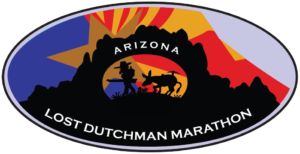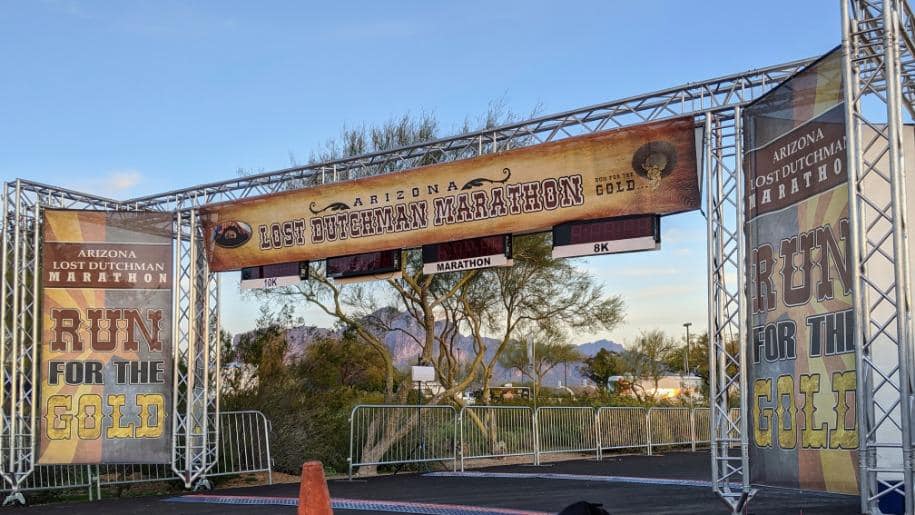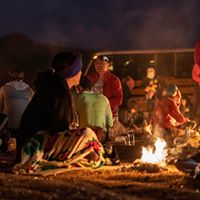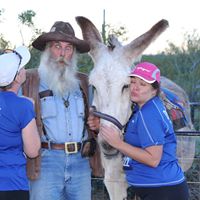Lost Dutchman Marathon
 There are definitely easier ways to die. Unconscious asphyxiation, firing squad, car crash…really, anything that takes less than three to six hours to complete would probably rank as “easier” than running a marathon. I mean, I didn’t actually *die* while running the Nineteenth Annual Lost Dutchman Marathon this weekend. I’m writing this, after all. But there were definitely moments on the course when I thought that death might be preferable. At rough guess, I’d say that those moments covered 21.4 miles of the 26.2-mile distance. The first few miles were downhill.
There are definitely easier ways to die. Unconscious asphyxiation, firing squad, car crash…really, anything that takes less than three to six hours to complete would probably rank as “easier” than running a marathon. I mean, I didn’t actually *die* while running the Nineteenth Annual Lost Dutchman Marathon this weekend. I’m writing this, after all. But there were definitely moments on the course when I thought that death might be preferable. At rough guess, I’d say that those moments covered 21.4 miles of the 26.2-mile distance. The first few miles were downhill.
My parents are snowbirds in Phoenix and every year I fly down to visit them from my home in Denver. Running the marathon gives me something to do and them something to watch me do. It’s a good system. The official race start process on Sunday morning saw 400 odd and a dozen or so normal runners riding school buses from Apache Junction up into the Superstition Mountains, where we were all disgorged into a pre-dawn parking lot dotted with small fires. I did not try to put any of them out. Instead, I chose one with a nice view of the brightening East and the fanned array of portapotties and hunkered down to stay warm until the starting gun. It’s as hard as you think to keep hundreds of gaunt people at 98 degrees on a 40-degree morning. Much shivering happened. There was an awkward dance performed as the skinny people extruded one limb at a time from their bundle of lycra and fleece to apply copious amounts of lubricant before tucking it back under wraps. We looked rather like a flock of flamingoes gingerly dabbling our appendages into Costco tubs of Ben-Gay and Vaseline.

Eventually, the sun rose and we prised ourselves away from the fires and started heading back to Apache Junction. I didn’t really want to, but somebody had shot off a gun and that seemed like a good reason to start running away. The running is the hard part about marathons because it lasts a long time. If you’re good at running, it doesn’t last so long, but I am not good at running. What I *am* good at is packing my running belt. A well-stocked running belt is the secret to a successful career in marathons. Some people just smash a few electrolyte gels into the pocket and hit the road. These people can often be seen running very fast, to give the impression of athletic skill, but don’t believe it. They’re just afraid to be on the course for more than three hours, lest they run out of gels. I prefer to carefully arrange my running-belt items like a Japanese zen garden and gels are just the start. A couple gels, a few salt tablets per estimated hour of running, four tabs of aspirin just to make everything hurt a little less, bite-size Snicker bars as a special treat for the half-way and 20-mile markers, a Chapstick (not for my lips, but to swipe a bit of that into my armpits or butt crack, as needed), and a knot of extra safety pins. When I run, the pills and pins rattle like an angry sidewinder. It’s the mark of a seasoned runner.
 Because of my death wish/athletic ambitions/personal delusion of grandeur, I’ve run a lot of marathons in a lot of states across the country. Most urban marathons are about the same–pavement and skyscrapers. The Lost Dutchman is the only one I’ve encountered where the landscape makes you think that Charles Bronson might be chasing you. The first several miles are on a gravel road that winds through the saguaro-covered foothills, giving a soft footing and easy decline to get your marathon off to a good start. When you finally get to pavement, the course wends its way through the neighborhoods of the Valley with wide vistas and low, rolling hills, punctuated by aid stations with orthodontia-laced teenagers and the inevitable cadre of retired folks. They are lovely voyeurs to the sight of salt-coated, sunburned, parched runners trying to gin up enough saliva to work those electrolyte gels down the hatch. It’s harder than it looks. I recommend not one, but two half-full paper cups of water.
Because of my death wish/athletic ambitions/personal delusion of grandeur, I’ve run a lot of marathons in a lot of states across the country. Most urban marathons are about the same–pavement and skyscrapers. The Lost Dutchman is the only one I’ve encountered where the landscape makes you think that Charles Bronson might be chasing you. The first several miles are on a gravel road that winds through the saguaro-covered foothills, giving a soft footing and easy decline to get your marathon off to a good start. When you finally get to pavement, the course wends its way through the neighborhoods of the Valley with wide vistas and low, rolling hills, punctuated by aid stations with orthodontia-laced teenagers and the inevitable cadre of retired folks. They are lovely voyeurs to the sight of salt-coated, sunburned, parched runners trying to gin up enough saliva to work those electrolyte gels down the hatch. It’s harder than it looks. I recommend not one, but two half-full paper cups of water.
The first ten miles of a marathon are fun. The second ten are hard. The last six are hell. And that 0.2 at the very end is the reason I swear off distance running every time I attempt this race. “Hit the wall,” “Bonk,” “Run out of steam…” However you want to describe it, when both your glucose and glycogen are depleted, the last part of a distance run is completed on grit and the fear of failure. This last one, at least, is a great motivator.
 If and when you stagger across the finish line, you get rewarded with permission to stop running. This, too, is tremendous motivator. You also get half a stale bagel, a wedge of orange, and a package of potato chips. The finish line is where the Lost Dutchman truly stands out as a destination event because you get the chance to take your picture with the guy who has the best retirement job in the greater Phoenix area: he dresses up as an old prospector and poses for pictures with a donkey. My dad would love this job, if he only had a selfie-worthy donkey to use.
If and when you stagger across the finish line, you get rewarded with permission to stop running. This, too, is tremendous motivator. You also get half a stale bagel, a wedge of orange, and a package of potato chips. The finish line is where the Lost Dutchman truly stands out as a destination event because you get the chance to take your picture with the guy who has the best retirement job in the greater Phoenix area: he dresses up as an old prospector and poses for pictures with a donkey. My dad would love this job, if he only had a selfie-worthy donkey to use.
Of all the marathons in all the states that I have been delusional enough to attempt, the Lost Dutchman is the one I keep returning to. 2020 was my fifth or sixth time over that course. I keep coming back because it’s so unusual, the people are so friendly, the race is well-supported and organized. The guy with the donkey is just the icing on the cake.






